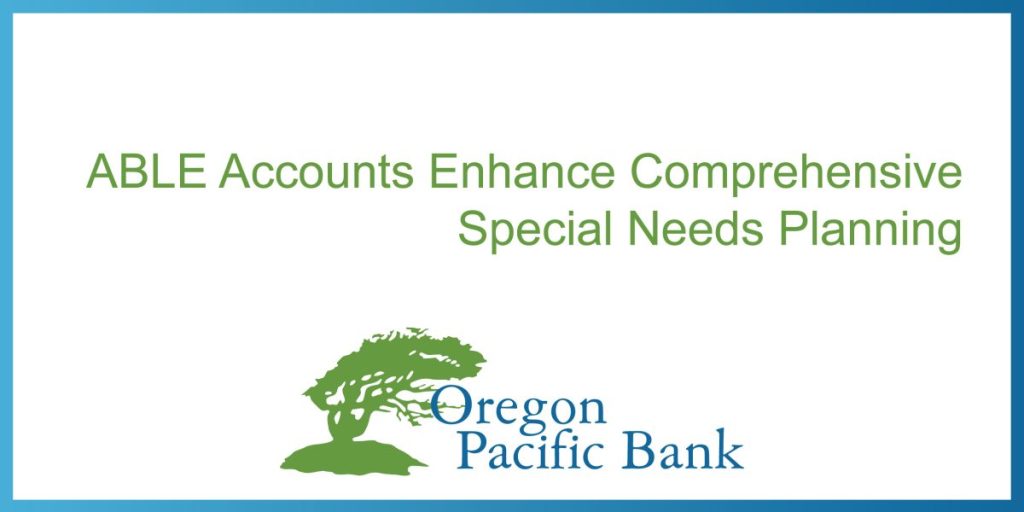A Special Needs Trust is a powerful tool to provide supplemental support to wrap around government benefits. An ABLE account can enhance public benefits by supporting any disability related expense. Together, they can provide comprehensive support for an individual with a disability.
Why create a Special Needs Trust?
Special Needs Trusts are created to protect the government benefits of a disabled person. Common benefits include income from either Supplemental Security Income (SSI) or Social Security Disability Insurance (SSDI), medical insurance benefits under Medicaid, Medicare, or the Oregon Health Plan, food assistance such as the Supplemental Nutrition Assistance Program (SNAP), various housing subsidy programs, and transition to work plans. Individuals and families can spend months or years obtaining these benefits. An outright distribution or inheritance could compromise eligibility for these programs, but a Special Needs Trust limits distributions to and for the beneficiary so they will not lose the benefits and assistance they depend upon. However, the required distribution limitations of a SNT, including no payments for food or shelter, can create other financial hardships.
What is an ABLE account?
Government benefits are essential for survival, but the associated income and spending restrictions limit their usefulness. In 2014, Congress passed the Achieving a Better Life Experience (ABLE) Act. An Oregon ABLE Savings Plan is a way for people with disabilities to save and spend for eligible expenses without losing their state or federal benefits. Here are some basic facts:
- Deposits to the account can have tax advantages for the contributor. The account can be invested and growth in the account is tax-free like a College Savings Plan (529).
- Account balances of $100,000 or less do not count as assets for purposes of benefit eligibility.
- There is no maximum age of the beneficiary.
- The beneficiary must have a disability or blindness that developed before the age of 26 that will last, or has lasted, at least a year.
- The account can be opened by the individual (alone or through Power of Attorney), or by a legal guardian or conservator.
- The account can be used for any disability related expense, which is a broader definition than expenses allowed within a Special Needs Trust and includes key living expenses like housing and food.
- Account funds can be utilized by a beneficiary with a prepaid credit card that has flexible and customizable spending limits.
So why have a Special Needs Trust if the ABLE can do all that?
While ABLE accounts are incredibly useful, they shouldn’t replace a well-crafted Special Needs Trust for a number of reasons.
- Balances (not contributions, but market value) over $100,000 in the ABLE account will impact the beneficiary’s means-based benefit.
- The beneficiary owns this account and has the right to take a distribution. Even if it is opened by a parent or power of attorney, the beneficiary can still spend the funds immediately rather than over a period of time as intended by the contributor.
- Investments in an ABLE generate tax-free growth, but the investment options are limited to the plans offered by the State.
- ABLE accounts cannot hold any real estate or complex assets so it could not buy a home for the beneficiary to live in if that was desired.
When should ABLE accounts be part of the plan?
ABLE accounts can stand alone or augment the effectiveness of a Special Needs Trust. Their flexibility makes way for creative solutions. If a person were to become incapacitated, their Living Trust or Durable Power of Attorney can instruct the Trustee or Agent to provide ongoing payments for a disabled family member through an ABLE account ensuring seamless support. A similar arrangement can be made in a Will or Trust so a beneficiary will be financially supported during the interim period between the date of death and the funding of the Special Needs Trust.
Here are some examples we have experienced:
Situation #1
Jennifer is 34 years old and lives a good life. She experiences autism and thrives in routine. Her hobbies include volunteering at a local animal rescue organization, creating pottery, and spending time with her friends mostly at the local coffee shop. Jennifer’s parents, Ronda and Steve, have helped her establish a community of support enabling her to live independently. Her parents provide funds to supplement the public benefits she receives to help her live comfortably and do the art and social activities she enjoys. As part of Ronda and Steve’s estate plan, they set up a Special Needs Trust with Oregon Pacific Bank as trustee to continue this support for Jennifer after they are gone. In talking to them, I learned their biggest concern was continuing Jennifer’s support if they became unable to manage their financial affairs, or during the transition period between their death and the funding of her SNT. As discussions continued, Ronda and Steve decided to set up an ABLE account for Jennifer. They had power of attorney and were able to do this easily since she was diagnosed prior to her 26th birthday. They ordered a Truelink debit card for Jennifer to use for art supplies, bus transportation and restaurants. They contributed $25,000 to the ABLE account and moved the $200 a month they had previously been providing in cash to Jennifer on to the card. Jennifer signed a Springing Power of Attorney that would allow Oregon Pacific Bank to manage the account should Ronda and Steve both become incapacitated or die. This gave Ronda and Steve peace of mind that there were funds ready for OPB to mobilize for Jennifer immediately should something happen to them without interruption to her routines and systems.
Situation #2
Daniel is 50 years old and has always managed his life and finances. He lives very frugally and works part-time at a local bookstore owned by a family member. He has subsidized housing benefits that assist him with the cost of rent and receives Oregon Health Plan medical benefits based on his disability (a lifelong mental illness diagnosed in childhood). There have been several times in his life he has been unable to work for an extended period of time due to mental health struggles. Daniel has always worked very hard to get healthier and back to work, but those periods are very rough financially, especially because he can’t ever have more than $2,000 or he loses his health insurance. His parents have always assisted him during tough times and wanted to continue to do so through a Special Needs Trust in their estate plan, but they were dismayed to learn housing and food are not allowable expenses. As their primary goal was to make sure Daniel was never homeless or hungry, they worked with their attorney to establish provisions in the Special Needs Trust that allow for distributions to an ABLE account. They have peace of mind knowing all of Daniel’s needs will be met without losing any of his benefits.
If you or your clients have questions about the administration of Special Needs Trusts, please reach out to one of our trust officers. You can learn more about ABLE accounts at www.oregonablesavings.com >





